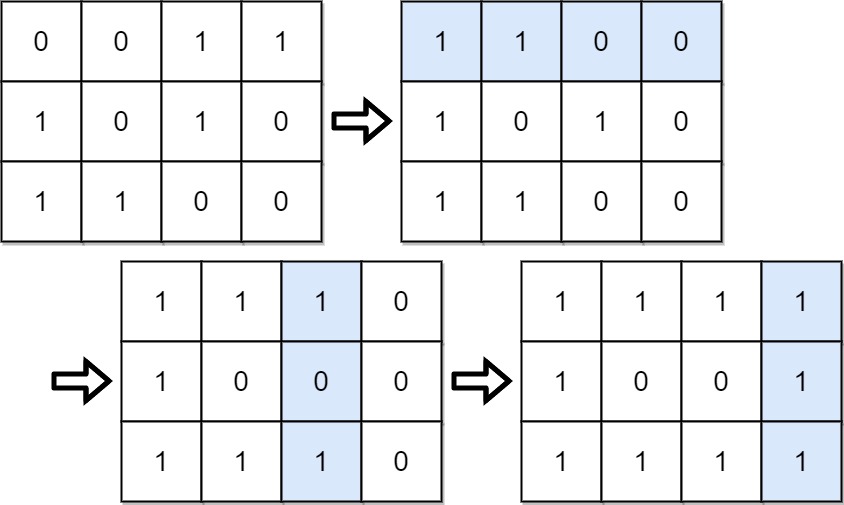LeetCode in Kotlin
861. Score After Flipping Matrix
Medium
You are given an m x n binary matrix grid.
A move consists of choosing any row or column and toggling each value in that row or column (i.e., changing all 0’s to 1’s, and all 1’s to 0’s).
Every row of the matrix is interpreted as a binary number, and the score of the matrix is the sum of these numbers.
Return the highest possible score after making any number of moves (including zero moves).
Example 1:

Input: grid = [[0,0,1,1],[1,0,1,0],[1,1,0,0]]
Output: 39
Explanation: 0b1111 + 0b1001 + 0b1111 = 15 + 9 + 15 = 39
Example 2:
Input: grid = [[0]]
Output: 1
Constraints:
m == grid.lengthn == grid[i].length1 <= m, n <= 20grid[i][j]is either0or1.
Solution
class Solution {
fun matrixScore(grid: Array<IntArray>): Int {
val m = grid.size
val n = grid[0].size
var score = 0
// Flip rows to make the first column all 1's
for (i in 0 until m) {
if (grid[i][0] == 0) {
flipRow(grid, i)
}
}
// Flip columns to maximize the score
for (j in 1 until n) {
var ones = 0
for (i in 0 until m) {
ones += grid[i][j]
}
if (ones < m - ones) {
flipColumn(grid, j)
}
}
// Calculate the score
for (i in 0 until m) {
var rowScore = 0
for (j in 0 until n) {
rowScore = rowScore * 2 + grid[i][j]
}
score += rowScore
}
return score
}
private fun flipRow(grid: Array<IntArray>, i: Int) {
val n = grid[0].size
for (j in 0 until n) {
grid[i][j] = 1 - grid[i][j]
}
}
private fun flipColumn(grid: Array<IntArray>, j: Int) {
val m = grid.size
for (i in 0 until m) {
grid[i][j] = 1 - grid[i][j]
}
}
}

